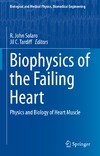Biophysics of the Failing Heart considers major biophysical mechanisms for why hearts responding to stressors enter into maladaptive processes, eventually leading to an inability of the heart to respond efficiently to hemodynamic loads — especially during exercise. The book describes biophysical techniques that have been applied to determine the triggers for the heart failure process, as well as the mechanisms for sustaining the disorders. These techniques include measurements of active and passive mechanical properties and hemodynamics at levels of organization ranging from molecules to hearts beating in situ. Biophysical concepts and approaches are also applied to determination of signaling and signal transduction, energetics, ionic currents, transport processes, electro-chemical and chemo-mechanical coupling.
Modern research approaches and clinical understanding of heart failure demands integration of multiple aspects of the disorders. By its emphasis on biophysical aspects of a prevalent clinical condition, this monograph is unique in its perspective and focus, and will be of value to clinicians and researchers at all levels.
 |
|
О проекте
|
|
О проекте


